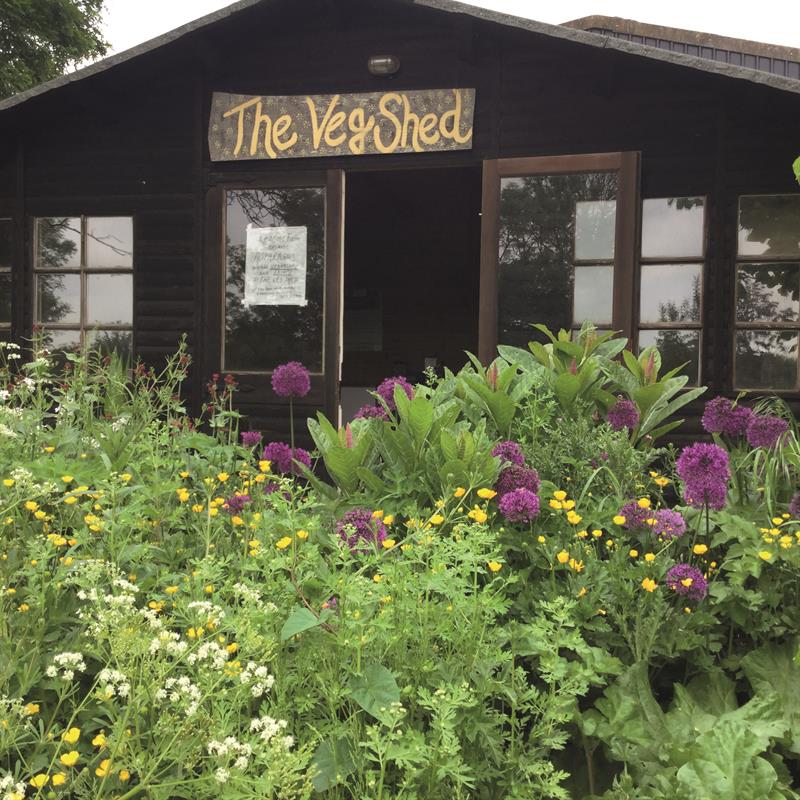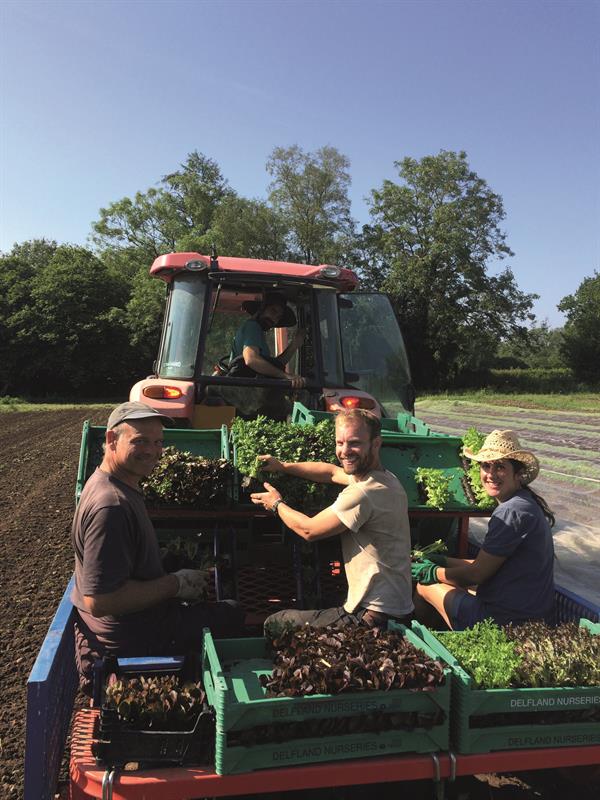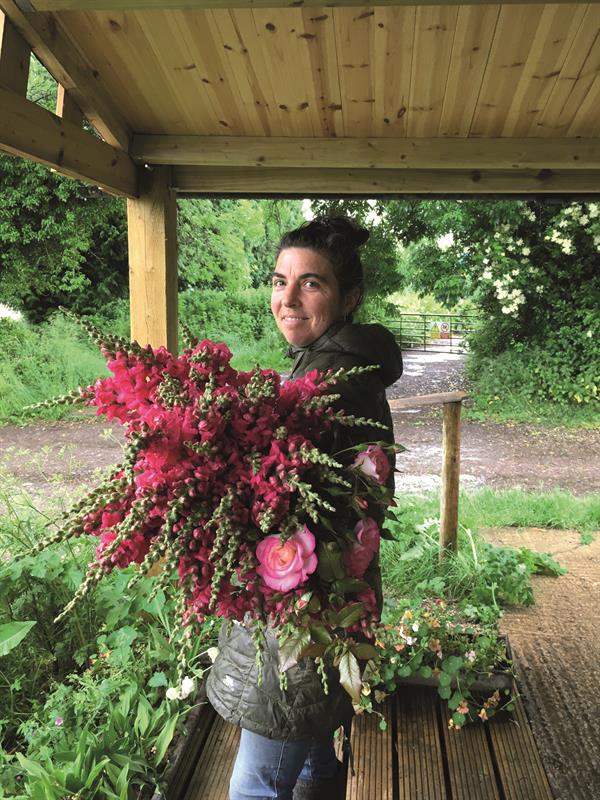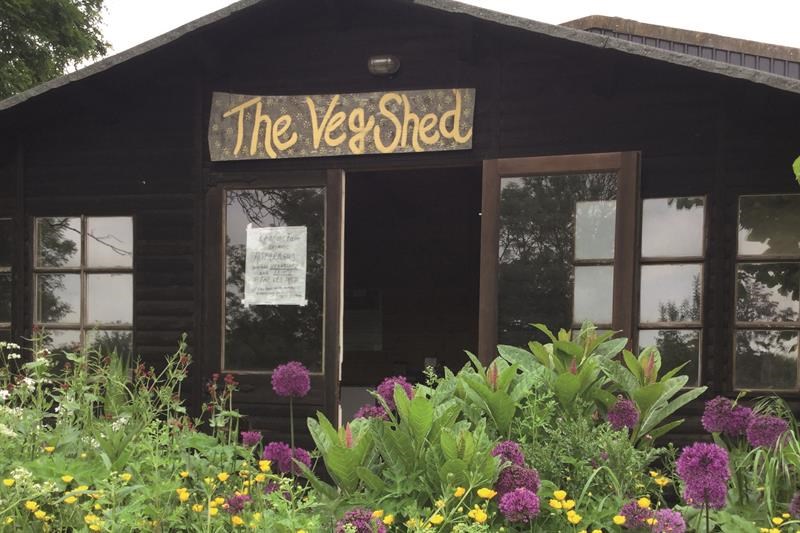For two decades, a small organic farm in south Wiltshire has been growing and gathering a large following of customers. Mary-Vere Parr visits the farm and says it is easy to see why.
A small wooden sign, tucked in the hedge of a narrow country lane off the A30, west of Salisbury, points to ‘The Veg Shed.’ It is easy to miss, but it is here that, during lockdown, cars queued up the track to reach the wooden shack where you can buy freshly picked organic flowers, salad, and vegetables.
“It was crazy during the first lockdown,” says Liz Barrah, who, with her husband Hugh Collins, runs Kensons Farm in Sutton Mandeville. “There were so many cars I turned into a car park attendant.”
The queue quietened down once markets could reopen, and Liz was able to get back to her stall at Salisbury market (Tuesdays and Saturdays) and Shaftesbury (Thursdays). But the picturesque Veg Shed continues to pull in the punters. Hugh has extended the veranda to shelter them in inclement weather, and the effect is more Little House on the Prairie than your average farm shop. There is a rocking chair in one corner, while inside the wooden shelves are filled with vegetable and flowers. “It looks really lovely,” Liz admits. “Everyone says I should be wearing a long dress!”
Undoubtedly, the pandemic has spurred interest in locally produced food. The Collinses, however, are old hands at selling direct to the public. They first converted the former pig farm to organic vegetable production more than 20 years ago. Liz started with a veg box scheme while the couple’s three children were small, graduating to a stall at Salisbury market as soon as the eldest started school.
Alongside the salad and vegetables, Liz also started growing traditional cottage garden flowers. She now has a third of an acre of outdoor beds, together with a polytunnel dedicated to her flowers. Like the vegetables and salad, everything is grown to Soil Association organic standards.
The flower season runs from April to October, beginning with an over-wintered tunnel of ranunculus, anemones, and tulips, quickly followed by hardy annuals such as cornflowers, larkspur, antirrhinums, sweet peas, and ammi. Through the season, lupins, poppies, corncockle, statice, clary, scabious, helichrysum, daucus, grasses, foxgloves, zinnias, dahlias, and asters all feature in the bunches Liz ties in her “flower cave” (a converted pig farrowing house) to sell at market and in The Veg Shed.
“The ranunculus start the season early, and I dry flowers to extend it at the end too,” she explains. When I visit in June, the tunnel is still a riot of colour: “Wherever there is a gap, I’ll stick a plant,” Liz grins.
For both the flower and vegetable business, it has been a case of learning on the job. The Collinses met while working on an organic farm in Bath and share a love of “practical work and doing things.” “Hugh has the farmer’s mentality of everything needs to be done before bed,” Liz laughs. “In the early years I found it very hard work, and some of our student workers find it overwhelming. There’s always something to be done and no time to sit down.”
‘We love the fact that children who have been raised on our food, come back as adults ’
With 15 polytunnels and 19 acres of vegetables and salads to look after, it is no surprise that they are busy. Produce ranges throughout the year from the humble spud through cauliflowers, cabbages, kale, broccoli, calabrese, carrots, and onions, to parsnips, leeks, spinach, and salad greens. They also grow asparagus, celeriac, fennel, and garlic. Organic vegetable growing is not for the faint hearted. It is labour intensive – and hard labour at that. Mechanisation helps, but much of the work is still done manually. The fields may be measured in old fashioned acres, rather than industrial scale hectares, but, even with a planting machine, a one-acre of plot of onions takes four people three days to drill. And then it is harvested entirely by hand.
On the day I visit the farm, however, I am met with the bucolic scene of three people gently hoeing a field of parsnips in the sunshine. The purposeful but peaceful activity is infectious: I feel I should grab a hoe and join in, but Adam Reid, one of three full-time growers, just laughs at me: “The parsnips are doing really well, it’s just the weeds are doing really well too!”
All the crops look wonderfully lush. But Liz warns: “You don’t know what you are going to find the next day - there is always something new. This year it was a flock of goldfinches feeding on my lupins.”
Adam describes it as being “at the sharp end of nature.” This medium sandy loam is good growing soil, enriched by years of green manures, such as red clover and phacelia, but it is at the mercy of the elements. Hugh, tanned in the way only a person who lives outside can be, greets me from his tractor with the million-dollar question: “What’s the weather going to do?”
The weather has thrown everything at them in recent years: drought in 2018 which plumbed the bottom of the farm’s irrigation pond; this year’s cold and wet spring which has seen the asparagus crop delayed by a month, and nearly washed away an entire crop of gem squash overnight. The cannonball variety is little known in the UK but prized in South Africa, and is sold via the farm’s internet shop.
There was no giving up on “Hugh’s baby,”Liz says. “It’s so important that these vegetables live.” They resowed the lot. Organic farmers face a plethora of pests and diseases, without the chemical toolkit available to conventional farmers. But one of the first things the Collinses did when taking on the farm from Hugh’s parents, was to rabbit and deer fence it. As we talk, Hugh catches sight of a single roe deer. It is lucky, he enjoys the rich wildlife of the farm. “It’s really important for us that there are a lot of wild areas,” Liz, who has a degree in conservation, says. The hedges drip with elderflower and dog roses, a steep bank of woodland leads down to the River Nadder, and the fields are divided by wide swathes of clover.
Beautiful as it may be, Kensons Farm is a growing business in both senses of the word, supplying not only retail but wholesale markets too. Salad is sent to Abel and Cole, and “everything we can supply” to the Community Farm in Bristol.
Variety is very much a selling point. “People want a mix of local produce,” Liz explains. The latest addition to the Kensons market stall is the shitake mushrooms grown by Adam.
“We love the fact that children, who have been raised on our food, come back as adults” Liz says. “Our aim is to provide as much veg as possible to local people all year round.” WL
• Kensons Farm: kensonsfarm.wordpress.com
This article first appeared in the September 2021 issue of Wiltshire Life. To subscribe please click here.



Check out our Welcome to Wiltshire guide with things to do, charity updates and more
